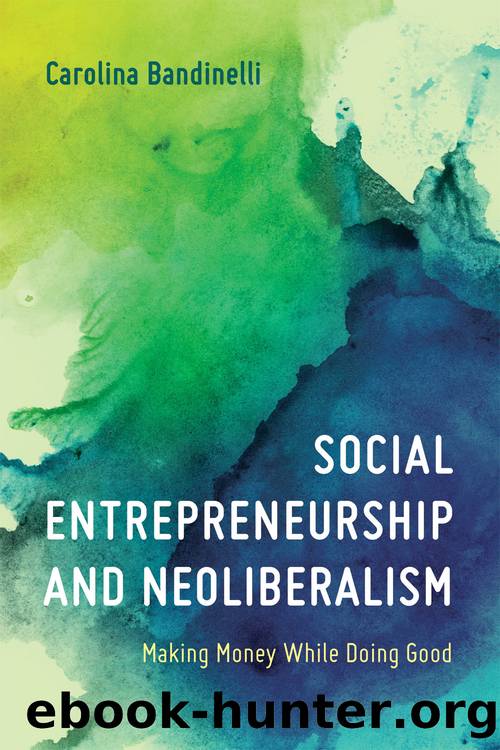Social Entrepreneurship and Neoliberalism by Carolina Bandinelli;

Author:Carolina Bandinelli;
Language: eng
Format: epub
ISBN: 9781786611086
Publisher: Book Network Int'l Limited trading as NBN International (NBNi)
Published: 2019-12-02T16:00:00+00:00
HEROIC SELF-CONFIDENCE1
Sergio, who we encountered earlier, confided in me that he has always had self-confidence issues. ‘I could never fully test myself, I was too scared of failure’, he admitted during One of our first conversations. Eventually, he started working full time for a social cooperative that is One of the most influential actors in the Italian social entrepreneurship network. Sergio immediately recognised the ethical burden of sociality and used to feel deeply uncomfortable about it: ‘All this buzz about changing the world etc.’, he told me, with the tone of One who is talking about something so ephemeral and impossible that does not even require further clarification: ‘They really wanted me to buy into it’, he continued ‘but I couldn’t fully believe in this story’. At the time, he was motivated by a different set of reasons: ‘I was working there cause I needed the money, and okay, it was better to work for some good guys than for the corporate sharks, but still. . . . I just did not feel like I was changing the world or anything like that, I did not feel part of them. And this made me suffer, I felt excluded’.
Sergio’s story demonstrates how the embodiment of an ethos is necessary to do One’s job. To work in a given field he had to foster an ethos, to promote and communicate a set of values to which he wasn’t naturally inclined. And I can sympathise with him: to believe that you can change the world, and to make substantial sacrifices on the basis of that belief, requires enormous self-confidence. Much of the discourse that surrounds social entrepreneurship reflects the need for this kind of confidence and self-belief. The mythic narratives we encountered in chapter II, where the social entrepreneur is conceived as a kind of messianic hero, is a discursive device that not only regulates social entrepreneurs’ behaviour through instilling an ethical ethos, but a tool that they can use to work on themselves, to reconfigure their patterns of thought, and produce a subjectivity that can muster the confidence on which social entrepreneurship depends. This is precisely what Sergio describes happened to him. For Sergio, frequenting Impact Hub resulted in a change in his approach towards his career, and therefore in his mode of thinking about himself and his future. Before being a Hubber, he thought differently about his opportunities and what was possible. Engaging with Impact Hub sociality, he developed a specific subjectivity, fashioned himself in a certain way and generated a form of social capital derived from self-belief.
This case highlights the productive nature of Impact Hub’s sociality. What is produced is a certain kind of self. An ethical endeavour is involved: a process by which One makes himself or herself a certain subject and that includes our response to invitations or injunctions to make oneself into a certain kind of person. Social entrepreneurs’ sociality at Impact Hub involves a process of self-fashioning that is essential for them to enter the scene and, eventually, the market.
Download
This site does not store any files on its server. We only index and link to content provided by other sites. Please contact the content providers to delete copyright contents if any and email us, we'll remove relevant links or contents immediately.
| Anthropology | Archaeology |
| Philosophy | Politics & Government |
| Social Sciences | Sociology |
| Women's Studies |
The Leavers by Lisa Ko(6473)
Born to Run: by Christopher McDougall(6260)
iGen by Jean M. Twenge(4702)
Sapiens by Yuval Noah Harari(4537)
The Kite Runner by Khaled Hosseini(4435)
Spare by Prince Harry The Duke of Sussex(4196)
Bullshit Jobs by David Graeber(3180)
Livewired by David Eagleman(3122)
Goodbye Paradise(2963)
Never by Ken Follett(2880)
A Dictionary of Sociology by Unknown(2518)
Harry Potter 4 - Harry Potter and The Goblet of Fire by J.K.Rowling(2416)
The Club by A.L. Brooks(2360)
People of the Earth: An Introduction to World Prehistory by Dr. Brian Fagan & Nadia Durrani(2346)
The Social Psychology of Inequality by Unknown(2311)
Machine Learning at Scale with H2O by Gregory Keys | David Whiting(2291)
Harry Potter and the Order of the Phoenix (5) by J.K. Rowling(2227)
0041152001443424520 .pdf by Unknown(2220)
Don't Sleep, There Are Snakes by Daniel L. Everett(2217)
